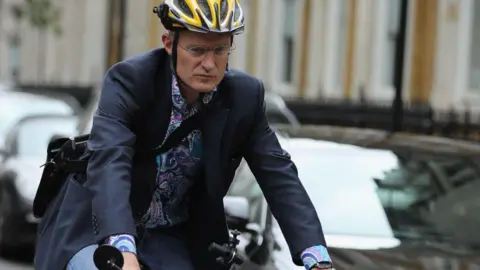**Jeremy Vine Halts Cycling Videos Amidst Online Abuse**
Jeremy Vine, renowned TV and radio presenter, has made the difficult decision to cease posting videos documenting his encounters with motorists during his cycling commutes. This announcement comes in light of the distressing level of online harassment he has faced, indicating that “it did get to me.” Vine has long been an advocate for cyclist safety, often highlighting the reckless behavior displayed by some drivers in the bustling streets of London.
For years, Vine has captivated audiences by sharing clips from his daily commute, blending wit and concern as he calls attention to dangerous driving practices. He has utilized these moments to foster a greater understanding of the vulnerabilities cyclists face while navigating busy urban environments. However, after a painful culmination of negative feedback and trolling online, Vine decided it was time to step away. In a poignant conversation with BBC Radio 4’s *World at One*, he expressed that the online criticism had become intolerable.
“Dealing with online flak, or what is now termed trolling, has been part of my experience,” Vine remarked. Despite the usual resilience one may expect from a public figure, the unrelenting nature of the abuse has weighed heavily on him. He stated, “In the end, I just thought I want to switch the narrative; I don’t want to do this anymore.”
The depth of the vitriol aimed at Vine has been startling. He recounted some of the more hostile comments directed at him, including threats that suggested harm should come to him while cycling. This alarming feedback underscores not only the personal toll it took on Vine but also highlights the widening chasm of road safety discourse in society today.
“What’s prevalent in this country is a certain religion around car driving,” he commented, implying that any criticism of drivers is met with backlash. This sentiment resonates through the ongoing discourse around pedestrian and cyclist rights, challenging the public to reassess preconceived notions regarding road usage.
Interestingly, Vine’s portrayal of motorists isn’t solely negative. He strives for a balanced narrative and encourages reflection on road safety across the board. However, some have characterized his commentary as overly aggressive, leading to disputes on social media over both his conduct and the behavior of the drivers he critiques.
In a previous podcast, Vine made a controversial statement suggesting that individuals lacking intimate relationships resort to driving cars, a remark that fueled further division in opinions surrounding his views. When confronted about his tone by *World at One* presenter Helen Montague, he defended his stance, asserting, “I’m just a safety-first kind of guy.” He underscored that advocating for cyclist safety is sensible behavior, while viewing cycling caution as something more militant only serves as a divider.
In addition to consistent online harassment, Vine revealed that personal incidents, such as having his bicycle stolen, influenced his decision to stop sharing his cycling experiences. He acknowledged that while his videos have amassed over 100 million views, the accompanying outrage has undeniably affected him.
“My intention was merely to provoke thought among drivers about the risks that cyclists face when sharing the road,” he explained, noting that he aimed to spotlight dangerous situations without intending to incite anger.
As a statistic, Vine once reported that he documented upwards of 40 driving infractions daily during routine commutes from Chiswick to the BBC’s Oxford Circus office. This aggressive approach to documenting unsafe driving practices has undeniably put him in the crosshairs of both criticism and support.
In summary, while Vine’s choice to halt his cycling videos may leave behind a gap in the conversation surrounding urban driving practices, it unmistakably sheds light on the darker side of online interactions and societal attitudes toward road safety. As he steps back from the spotlight, his experiences may inspire discussions around the need for respectful engagement and consideration for all road users.



